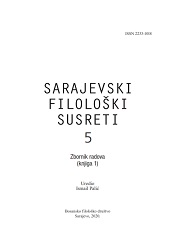Gramatička svojstva glagola zbivanja
Grammatical Properties of Verbs of Happening
Author(s): Ivo PranjkovićSubject(s): Syntax, Semantics, Pragmatics, South Slavic Languages
Published by: Bosansko filološko društvo
Keywords: verbs of happening / Geschehensverben; stative verbs; dynamic verbs; imperative; verbal aspect; category of person; category of number; subjectless sentences;
Summary/Abstract: This paper focuses on the definition and the grammatical, semantic and pragmatic properties of verbs of happening, i. e. Geschehensverben (verbs that express events caused by forces of nature and those that are not conditioned by will even when they refer to people), especially in relation to the dynamic and stative verbs. Examples include kišiti (“to rain”), grmjeti (“to thunder”), mračiti se (“to darken, to grow dark”), klasati (of grain:“to form ears”), mirisati (“to smell”), venuti (“to wither”), boljeti (“to hurt”). This analysis focuses on their relation to the categories of person (mostly used in impersonal constructions), aspect (predominantly used in imperfective form), tense, mood (e.g. they never appear in the imperative mood), and number. Special attention is paid to the functions of these verbs in simple sentences, primarily to the fact that these verbs tend to appear in subjectless sentences.
Journal: Sarajevski filološki susreti: zbornik radova
- Issue Year: 5/2020
- Issue No: 1
- Page Range: 9-18
- Page Count: 10
- Language: Croatian

